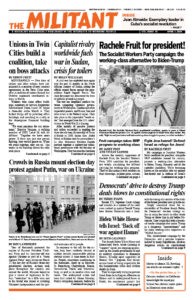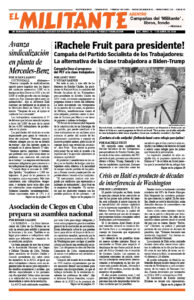A civil war has exploded once again over the past 11 months in the North African country of Sudan, pitting the official armed forces against the paramilitary Rapid Support Forces. The clash for power has devastated the lives of millions of working people.
The war has deepened conflicts between competing capitalist governments in Washington, London and other imperialist powers, and Russia, Iran and other actors in the Mideast region. They take place as the imperialist “world order” that emerged from the U.S. rulers’ victory in World War II is fraying.
After months of massive protests and strikes succeeded in toppling the three-decade-long dictatorship of Omar al-Bashir in 2019, Sudan Gen. Abdel Fattah al-Burhan and the paramilitary’s Lt. Gen. Mohamed Hamdan Dagolo patched together a military-led transitional government with the blessing of Washington. They became the chairman and deputy chairman of a new Transition Sovereign Government, promising eventual civilian rule, with elections scheduled for 2022.
Instead, they conspired to carry out a coup in October 2021, deposing appointed civilian Prime Minister Abdalla Hamdok, suspending the 2019 transitional constitution, and brutally repressing protests by workers, herders and farmers.
Dagolo’s Rapid Support Forces had come together in 2013 from what had been the rural Arab-based Janjaweed militias created under the Bashir dictatorship. They had violently suppressed a rebellion by oppressed black African tribal forces in Darfur in western Sudan in 2003.
Washington had moved to gain a greater foothold in Sudan, given the country’s natural resources, including gold and oil, and its strategic location in the Horn of Africa and access to the Red Sea. In 2020 President Donald Trump removed Sudan from the list of “state sponsors of terrorism” after Khartoum normalized its relations with Israel.
The U.S. government attempted to pressure Sudan’s competing army and paramilitary to combine their forces into a single army. “The problem was that neither Burhan nor Hemeti [Hamdan Dagolo] wanted to give up the power that he’d accrued,” noted Foreign Policy magazine.
As fighting erupted last April 15, Joseph Biden’s secretary of state, Antony Blinken, completely misread the unfolding war, telling the media, “This is a real opportunity to finally carry forward the civilian-led transition.”
Airstrikes and shelling targeting residential neighborhoods have claimed thousands of civilian lives in Khartoum, the capital, and the nearby cities of Omdurman and Bahri. The fighting has expanded throughout the country, which is nearly three times the size of Texas.
Over the past 11 months, the conflict has displaced over 8.1 million people — 15% of Sudan’s total population. Some 1.6 million have fled into neighboring Chad, South Sudan, Egypt and Ethiopia. Hunger levels are the “highest ever recorded,” reports the World Health Organization, and 70% to 80% of health facilities in Sudan are no longer functioning.
Growing conflicts over Sudan
The reactionary regime in Iran offered its support to Sudan’s military government. After a seven-year break, diplomatic relations between the two countries were reestablished. Tehran is supplying Burhan’s Sudanese Armed Forces with combat drones. It asked for permission to build a permanent naval base on Sudan’s Red Sea coast and offered to provide a helicopter-carrying warship in return. So far, no agreement has been reached.
A naval base on the Red Sea would allow Tehran to tighten its grip on one of the busiest shipping lanes in the world, where its proxy Yemen-based Houthis launch attacks on vessels headed for Israel. Tehran’s major regional rivals, Israel, Egypt and Saudi Arabia, all have direct access to the waterway, and are seeking their own edge there.
Russia’s paramilitary Wagner Group, now controlled by Russian President Vladimir Putin, has an agreement with Rapid Support Forces leaders to mine gold in areas it controls for export to help fund Moscow’s war against Ukraine. Wagner has also trained RSF fighters, who are proving more capable than Burhan’s forces, despite his control of the country’s air force.
When the civil war erupted, the Rapid Support Forces initially refused Wagner’s offer of heavy weapons, not wanting to cut all relations with Washington. But after military setbacks in April, the group got Wagner to bring in more combatants from the Central African Republic, who assisted the RSF in taking most of Khartoum.
The government of Ukraine, locked in a fierce battle to defend its independence from Putin’s invasion, sent sharpshooters to Sudan to target Wagner forces.
The United Arab Emirates is also supporting Dagolo, supplying the RSF with military equipment. Dubai is officially the biggest importer of Sudanese gold. In 2022 a UAE-based consortium signed a $6 billion deal to build a new port facility on Sudan’s Red Sea coast.
The Egyptian government, on the other hand, backs the Sudanese Armed Forces, supplying it with drones.
Another big player is the regime in China. The Sudanese government owes over $5 billion to Chinese businesses and another $2.5 billion to China’s state oil company.
And, of course, the U.S. rulers have increased their forces in the Mideast since the Oct. 7 pogrom in Israel by Tehran-backed Hamas. It has two aircraft carrier groups in the Red Sea, numerous other vessels, and operates out of air bases in Jordan and elsewhere in the region.
All this maneuvering for allies, markets, military advantage and position by competing capitalist powers — in the midst of Putin’s war on Ukraine and Israel’s efforts to defend its right to exist as a refuge for Jews — threaten deeper military conflicts to come.

